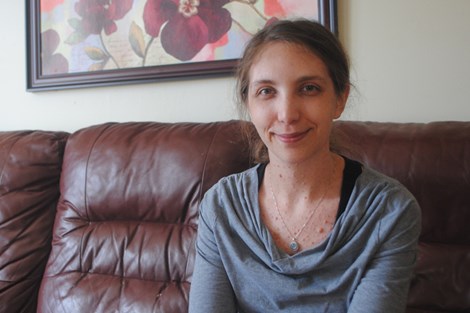In 1999, when Mariah Decata was just eight years old, her parents took her to the doctor so he could look at the bumps forming on her skin.
“Our family doctor had strong suspicions that I had Neurofibromatosis, but to officially diagnose it, I was sent to a specialist in Toronto,” says Decata. “It was confirmed there that I did have this rare disease.”
Decata was diagnosed with Neurofibromatosis Type 1 (NF1) that same year.
NF1, sometimes referred to as Von Recklinghausen’s disease, affects only one in every 3,000 people. According to Johns Hopkins Medicine, it’s “one of the most common inherited neurological disorders.”
That didn’t stop other kids from singling Decata out, though.
“I faced a lot of torment from other kids,” says Decata. “Bullying was an everyday occurrence for something that was out of my control, for simply looking different.”
NF1 causes spots, bumps, and tumours to grow on a person’s skin, nervous system and eyes. Cases can range from mild to severe. In the more severe cases, tumours on the spine, optic nerve, or in the brain can cause paralysis, blindness and learning disabilities.
Many people with NF1 choose to remove the larger tumours due to the discomfort they cause, or due to the risk that they could become cancerous.
“It can cause pain, itchiness, headaches and swelling at times,” says Decata.
Decata already had one surgery in September to remove two golf-ball sized tumours from her right wrist. She will be returning later this week for a follow-up surgery.
She has to regularly attend appointments with doctors and specialists.
“I go for yearly eye exams to see if any tumours are growing on my optic nerves,” says Decata. “Every few years, I have MRI’s to check if I have any tumours growing on my spinal cord, inside my brain or on any other organ.”
Decata’s condition may be considered on the milder side, but that didn’t deter the bullying.
“It got to the point where these kids told me to kill myself because no one would ever love me. It was heartbreaking.”
Decata, now 26, says her quest for love was difficult at times, but she did find love.
“When I started dating, it was tough,” says Decata. “Some people accepted it while others did not. I am happily married and my husband has always been supportive to me.”
Dacata says it can be hard to feel supported or accepted when you look “different.”
“People are often afraid of what they don’t know, and seeing someone with my condition can be frightening,” says Dacata. “They are afraid that they could catch what I have.”
NF1 is not contagious; it is only passed down genetically.
“Once people learn about it, it’s often less scary to them,” says Decata. “Now that I’m starting to gain some self-confidence, I’m definitely more open to speaking out about NF and what people with my condition go through.”
Decata says that though her self-confidence is growing, she does still struggle with maintaining a positive self-image.
“I do try to hide it,” says Decata. “I avoid wearing bikinis and backless or low cut clothing.”
Decata says her own struggles have helped her gain empathy for others.
“I’ve always been the nice, friendly person to everybody because you can never judge a book by its cover,” says Dacata. “I don’t judge anyone by their illness or condition because I’ve been in a similar position my entire life.”
Even if a person has never been in the same situation, says Decata, they can still build empathy by informing themselves.
“When I hear about an illness that I’ve never heard of, I tend to do some research about it so I can better understand what that person truly goes through.”
If you’re not sure, just ask.
“We are not monsters,” says Decata. “I would much rather have someone politely ask me about my condition than point, stare, laugh or make rude comments.”
“Instead just ask, and you will learn that we are just like you.”
In the end, Decata just wants people like her to be accepted for who they are on the inside.
“We all have our imperfections, but that doesn’t have to define who we are.”



